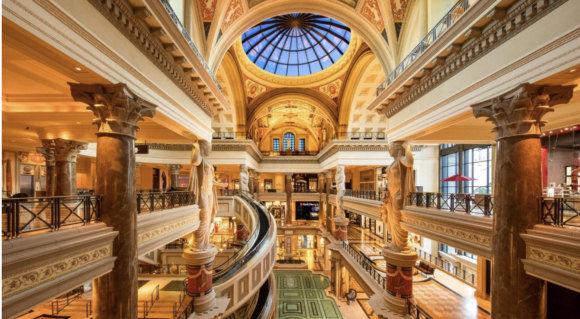Multiple hedge funds are making long shot bets on COVID-19 business-interruption claims, despite a long string of losses in state and federal courts, according to a report by Wall Street Journal.
The newspaper, citing anonymous sources, reported Thursday that Avenue Capital Group paid roughly 10 cents on the dollar for a $330 million share of a claim filed by Caesars Entertainment against its insurers. The casino and hotel owner filed a lawsuit in 2021 seeking more than $2 billion from an insurance tower that includes Allianz SE, Chubb Ltd. and Markel Corp. subsidiaries, and Aspen Insurance Holdings.
The Journal reported that its sources said “a number of” hedge funds have made similar investments, but did not identify any other funds by name. The report did say that Avenue sold off a portion of its stake in the Caesars claim to Highbridge Capital Management LLC and Saba Capital Management LP.
The vast majority of federal courts and at least 19 state Supreme Courts have ruled against businesses that filed claims for income lost because of COVD shutdowns, finding that property must be altered in a tangible way to qualify as direct physical loss or damage covered by commercial property insurance policies. The Vermont Supreme Court and a few other appellate courts have ruled otherwise, however, potentially giving investors in such claims a distant chance.
Robert Hartwig, an associate professor at the University of South Carolina and former executive director of the Insurance Information Institute, said he doesn’t like the hedge fund investors’ odds.
Hartwig said in an email that COVID-19 does not constitute a direct physical loss caused by a covered peril. The casino’s losses were primarily caused by a sharp reduction in demand.
Furthermore, Hartwig said allowing third-parties to benefit from someone else’s insurance claim violate the principle of “insurable interest,” which requires some logical financial relationship between the insured and the beneficiary of the payout. He said the investment is akin to purchasing a life insurance policy that covers another person’s property or life; such gambles are clearly not in the public interest.
“The bottom line is that Caesar’s is holding a losing hand and knows its odds of prevailing are remote,” Hartwig said. “For that reason, it has every incentive to monetize the small probability of winning these cases. If they thought there was even a reasonable chance of prevailing, they’d follow through with the suit on their own.”
Policyholder attorney David B. Goodwin, with the Covington and Burling law firm in San Francisco, said the value of Avenue’s investment depends on the exact wording of Caesar’s insurance policy.
“As a result, it is impossible to generalize, but some COVID-19 insurance claims could be quite valuable to potential investors, whereas others might not be a good investment,” Goodwin said in an email.
No Nevada appellate court has yet ruled on whether the COVID virus can cause a direct physical damage or loss, but that may soon change. The Nevada Supreme Court is considering arguments in an appeal filed by Starr Surplus Lines Insurance Co. after a Clark County judge ruled against its motion to dismiss a lawsuit filed by JBG-Vegas, owner of the Mirage casino.
Caesar’s lawsuit, like JGB’s, is being heard by the 8th Judicial Circuit Court in Clark County. State courts have generally been more friendly to policyholders with COVID business-interruption claims than federal courts, data compiled in a litigation tracker maintained by the University of Pennsylvania’s Carey Law School shows.
The UPenn database shows that the Ninth Circuit Court of Appeals has ruled against policyholders in three appeals related to COVID business-interruption claims.
Top photo: The interior of the Caesar’s Palace Hotel, one of several in Las Vegas that are owned by Caesar’s Entertainment, is shown.
Was this article valuable?
Here are more articles you may enjoy.


 China Bans Hidden Car Door Handles in World-First Safety Policy
China Bans Hidden Car Door Handles in World-First Safety Policy  UBS Top Executives to Appear at Senate Hearing on Credit Suisse Nazi Accounts
UBS Top Executives to Appear at Senate Hearing on Credit Suisse Nazi Accounts  Founder of Auto Parts Maker Charged With Fraud That Wiped Out Billions
Founder of Auto Parts Maker Charged With Fraud That Wiped Out Billions  Cape Cod Faces Highest Snow Risk as New Coastal Storm Forms
Cape Cod Faces Highest Snow Risk as New Coastal Storm Forms 